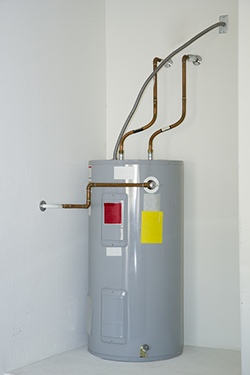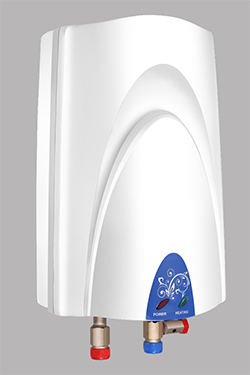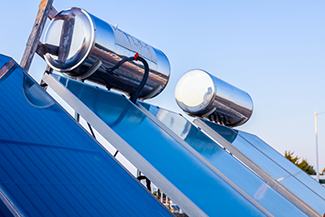Oh, You’re In Hot Water Now!
Oh, You’re In Hot Water Now!
How do you know when summer has officially arrived in Arizona? When the water coming out of the cold faucet is hotter than the water coming from the hot faucet! And that’s no joke!
 When winter rolls around however, you'll want to make sure your water heater is working properly. There are also options you may not be familiar with if it's time to purchase a new one. Here’s what you may not know about the hot water in your home:
When winter rolls around however, you'll want to make sure your water heater is working properly. There are also options you may not be familiar with if it's time to purchase a new one. Here’s what you may not know about the hot water in your home:
How A Traditional Hot Water Heater Works
Most homes have a tank-type water heater. This type has a large, insulated storage tank that holds hot water until it's needed. The cold water enters the bottom of the tank and is heated by a gas flame below the tank or electric elements suspended inside the tank. An adjustable thermostat regulates and maintains the water temperature. A pressure-relief valve prevents an excessive buildup of pressure inside the tank. When the hot water is turned on at the faucet or appliance, heated water is pumped out the top of the tank and through the building’s hot-water supply pipes. As the water level drops in the tank, it’s automatically refilled with cold water, and the whole process starts over again.
With a conventional tank-type water heater, you typically wait for 30 seconds or more after turning on a spigot before the water warms up. That’s a waste of water. Consider adding a recirculating pump that delivers instant hot water at every faucet. Choose a pump with a timer so you can program it to start heating the water 15 minutes before you usually take your morning shower. That way, you won’t waste energy heating water you’re not going to use, and you’ll still have hot water in an instant when you turn on the faucet. For instance, at Rosie’s house the timer is on from 4:30 a.m. to 7:30 a.m. and again from 4:30 p.m. to 8:30 a.m. The rest of the day the circulation pump is off.
Flushing Your Water Heater
Because Arizona has such mineral-rich water, it’s important to flush your water heater every year to rid it of the buildup of sediment and minerals. It’s a fairly simple project. Click here or watch the video above to learn how. But, if you haven't drained an aging water heater for several years, don’t bother. The sediment may have turned into solid rock in the tank, and the draining process may even cause a water heater to leak.
Before draining, read the instruction manual for your tank. If you don’t have the manual, check out our instructions for draining water heaters: Maintaining Your Water Heater. If the process seems too tricky, call a plumber.
Install a water softener to slow down the buildup of sediment in the water heater.
A Stinkin’ Tip: If your hot water starts to smell bad, there may be a problem developing in the water heater. Replace the water heater anode rod; it can corrode over time. The metal rod is designed to deteriorate to protect other metal parts in the tank. Learn more here.
Be alerted before disaster strikes. SimpleSENCE is an easy, reliable, and affordable leak/freeze detection system. This WiFi connected device with a mobile app for installation and monitoring has no limit to the number of sensors that can be placed throughout any property.
Broadcast Interview with SimpleSENCE: LISTEN NOW!
Tankless Water Heater
 Tankless water heaters, also known as instantaneous, continuous flow, inline, flash, on-demand, or instant-on water heat the water only when you need it. Say goodbye to a big tank full of water nobody's using and taking up space. Instead, when a faucet is turned on, the tankless water heater simply turns on a heat exchanger or heating coils as soon as it detects water flow. Once the faucet closes and the water is no longer detected, the coils automatically turn off. It only takes about five seconds for the tankless water heater to heat water for use. You no longer need to worry that there will not be enough hot water left for the next shower .
Tankless water heaters, also known as instantaneous, continuous flow, inline, flash, on-demand, or instant-on water heat the water only when you need it. Say goodbye to a big tank full of water nobody's using and taking up space. Instead, when a faucet is turned on, the tankless water heater simply turns on a heat exchanger or heating coils as soon as it detects water flow. Once the faucet closes and the water is no longer detected, the coils automatically turn off. It only takes about five seconds for the tankless water heater to heat water for use. You no longer need to worry that there will not be enough hot water left for the next shower .
IMPORTANT NOTE:
It is universally recommended that a whole-house water treatment system be installed. Flash-heating water causes the minerals to build up much faster than a conventional system. Without the softener, the tank's manufacturer will likely not warranty the unit.
Hybrid Water Heater
A hybrid water heater has a tank equipped with an electric heat pump. The pump is mounted on top of the water storage tank. It uses a compact compressor and evaporator coil to capture heat from the room air and then transfer it to the incoming cold water. The result, as noted by Popular Mechanics, is hybrids use 60% less energy than a conventional water heater. If you are interested in this set up, proceed with caution. Use an established company that is familiar with this equipment. Many plumbers don’t have the familiarity to service these pieces of equipment.
A hybrid water heater costs nearly twice as much as a standard water heater, but you could recoup that expense within three to four years through lower electric bills. State and local energy rebates can shorten the recoup time even more.
Solar Water Heater
A solar water heater performs three basic operations before hot water comes out of your faucet.

- It absorbs heat from the sun through a solar collector that is usually mounted on the roof.
- It transfers heat energy from the water collector to a water storage tank.
- It stores the solar-heated water in an insulated tank until you need it.
A solar water heater costs several thousand dollars, compared with a traditional water heater, which typically costs hundreds. But after you claim any federal or state tax credits and utility incentives that may be available, you may be able to buy a solar heater for just a couple of hundred dollars more than a conventional model, and you could save money every month on your electric bill.
Hire a plumber who has experience with solar water heaters to install it for you. Once the collector is on your roof, it will start harvesting sunshine, which will turn into the heat that warms the water in your tank. Because most Arizona days are sunny, you can save on your hot water bills right away.
Don’t Use Hot Water Here:
When using the garbage disposal, always use cold water. Hot water will liquefy fats in the garbage and drive that liquid farther down the drain. When the hot water is turned off, the fat will harden and clog the pipe.
Home Maintenance Calendar To Do: #HotWater
Podcast
Water heaters have come a long way from the traditional tank. Now there's tankless, hybrid and solar heaters too! With proper maintenance, they can keep you 'hot' for years to come; tune-in, we discuss the pros and cons of each type. Plus homeowner questions on flat roof coating cracks, adding a bathroom and mini kitchen to an existing sunroom and suggestions for a front door replacement.
###
Photo Credits:
- Shutterstock
RELATED CONTENT:
- Blog: Home Water Audits
- Blog: Tankless Water Heaters
- Blog: Water Treatment Softening Myths
- Blog: Water Treatment From A One-Time Skeptic
- DIY FAQ: Maintaining Your Water Heater
- DIY FAQ: What Homeowners Need To Know About Water Heaters
- DIY FAQ: How Can I Get Instant Hot Water From My Faucet
- DIY FAQ: Solar Water Heaters
- DIY FAQ: The Pros And Cons Of Tankless Water Heaters
- DIY FAQ: Rosie's Water Treatment Consumer Guide
- DIY FAQ: Clean Water For Your Home
- Podcast: Plumbing Maintenance, Water Saving And Gas Fitting Appliances
- Podcast: Earthships & Water Treatment
- AZWQA: Water Softener Sustainability Professional | Arizona
- Arizona Water Quality Association: AZWQA.org
- Environmental Working Group’s What’s In Your Water Program
